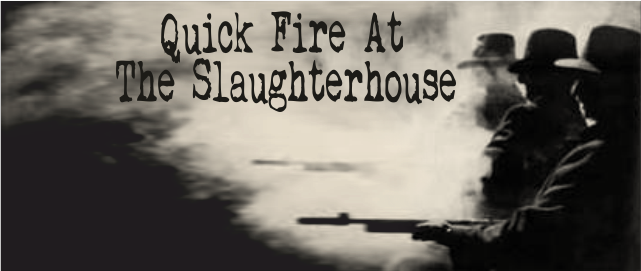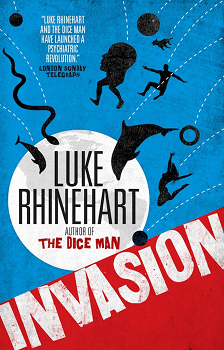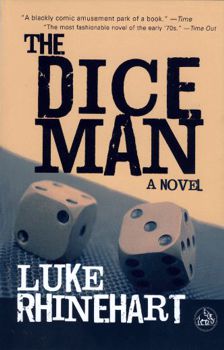
Luke Rhinehart is the author of the ground-breaking cult classic The Dice Man, a novel that defies genres and classification, that is at once comedy and iconoclasm. He has continued to enjoy a career whose vicissitudes exemplify the ongoing need for classification driven by the publishing industry. He has a new novel out, Invasion, which I describe as incisive, iconoclastic, humane and utterly compelling. Luke met me at The Slaughterhouse for a second round of questions and we talked about Dice and Invasion.
How would you write The Dice Man today?
We wouldn’t, of course, write THE DICE MAN today. We are now many different selves, and very few of them existed back in the late 1960s and 1970 when THE DICE MAN was written. Our present selves want to write other books. And the society that we want to communicate with has changed too, although mostly for the worst. And finally, the book written back then still seems to find readers today, being published in three times as many countries in the last decade as it was in the decade of the ’70s.
Our not considering writing the book again today does not mean that we don’t find serious flaws in the book. As writers, we have dozens of revisions that we think would make it a better book. But we’re also aware that we could be wrong: that the initial burst of creativity that lead to THE DICE MAN published in 1971 might have produced something that no amount of careful editing would particularly improve upon. It is a flawed book, but who is wise enough to eliminate the flaws without also eliminating some of the virtues?
We have revised two of our other novels. We revised LONG VOYAGE BACK in the nineties for a new edition and have revised ADVENTURES OF WIM into WHIM. But we have mostly concluded that any improvements made in either book were not significant to anyone but us.
Tell us about INVASION and how it reflects modern day America.
 My novel THE DICE MAN and now INVASION focus in different ways on why modern human beings are less happy than “progress” would seem to indicate they should be.
My novel THE DICE MAN and now INVASION focus in different ways on why modern human beings are less happy than “progress” would seem to indicate they should be.
THE DICE MAN dramatized and satirized the misery of humans caused by their feeling they had to have a single self and be consistent. Luke the Diceman showed some of the ways to free oneself from the grip of self, ruts, and consistency. The novel focused on individuals.
INVASION satirizes modern Western capitalist society and dramatizes some of the ways the society as a whole is sick, which, of course, makes most of its members sick. When super-intelligent aliens come to the planet they see that the way the dominant species has arranged things (modern civilization) tends to make life for most human beings and most other life on the planet more and more miserable. The phrase “most human beings and most other life on the planet” is key, because the top ten percent or  so of the humans in the richest developed nations benefit from the civilization and are mostly quite happy with it. For them progress is wonderful. But for most of the planet, industrial and technological progress is more often a disaster. The aliens, called FFs in the novel, have not come to conquer a planet nor as scientists simply to observe. They make intra-universe trips in order to find new forms of life to play with. They have come to play.
so of the humans in the richest developed nations benefit from the civilization and are mostly quite happy with it. For them progress is wonderful. But for most of the planet, industrial and technological progress is more often a disaster. The aliens, called FFs in the novel, have not come to conquer a planet nor as scientists simply to observe. They make intra-universe trips in order to find new forms of life to play with. They have come to play.
In fact the FFs see human civilization as having taken a wrong turn in becoming so ambitious, serious and purposeful. They see the playfulness of children and of young animals of all species as healthy, and the seriousness and purposiveness soon drubbed into them by their society as unhealthy.
Many of those humans alienated from their society find the FFs delightful, and many join “For-the-Helluvit” movements throughout the world to raise a middle finger to the various establishments they feel oppressing them. However, when the FFs begin hacking NSA sites, banks, corporations and the military, the U.S. government is not amused. In leaking more secret material than a thousand Wikileaks or Edward Snowdens the FFs are seen as terrorists and attacked as such. The novel climaxes in the middle of a million people protest march and dance-in, beerfest, sleep-in event in New York’s Central Park.
I finished INVASION more than a year and a half ago but see now that it foreshadows the successful anti-establishment political campaigns of Donald Trump and Bernie Sanders and the anti-establishment Brexit vote in the U.K. Many citizens in advanced civilizations have become disillusioned with their lives and their societies, although few can articulate exactly what they are rebelling against. I hope INVASION will give a few people some ideas about what is wrong with our great modern progress.
You often refer to we rather than I. Is it your experience, as for example it was for the playwright Samuel Beckett’s, that identity as a continuum is illusory, perhaps a social construct arguably aimed at social engineering, and that we are a series of ‘I’s’? And how do the Gurdjieff, Ouspensky teachings reflect in your writing and outlook as a Revolutionary Artist?
Identity as a continuum is indeed illusory, a social construct which makes social engineering easier. We could say, and I often do, that a human being is a series of ‘I’s, but that too is a simplification. There is a flow of consciousness in which thoughts, sensations, ‘decisions,’ flow singly and in clusters and some of those flowing thoughts seem to be trying to organize the flow, but those thoughts too are simply part of the seemingly random flow. In my book “Our Autobiographies” where normally an autobiographer would use ‘I’ we use ‘we,’ as a way of acknowledging that all humans are multiple and no single self ever dominates a single day, much less a lifetime. We are not consistent, and how wonderful that is. Robots can be consistent; humans are random. They are like electrons suddenly ‘deciding’ to go off in an entirely new direction. Decisions happen. There is no decider, only the illusion of a decider.
We read widely in Gurdjieff and Ouspensky (as well as other sufis, Zen Buddhists, Taoists and ‘thinkers’ like Alan Watts and Ram Dass) in the years both before and after writing THE DICE MAN. All influenced us. One of Gurdjieff’s techniques was to force his followers to do things they’d never done before—clearly related to what happens with dicing. But what other aspects of his thought has seeped into our work none of us can tell.
How Universal are your characters?
The word ‘universal’ doesn’t mean much to me, so let me try to use different categories to classify characters in fiction.
Most fiction dramatizes the lives of ‘normal’ human beings, and this may be what is meant by ‘universal’. Several of my books are in this sense traditional fiction: WHITE WIND, BLACK RIDER (originally published as MATARI), LONG VOYAGE BACK, SEARCH FOR THE DICE MAN, and NAKED BEFORE THE WORD. In these four books the characters are all normal human beings. Although a few characters may be heroic, all are typically flawed.
But I think in THE DICE MAN, WHIM, JESUS INVADES GEORGE, and my new novel INVASION I am doing something different. Luke in THE DICE MAN is not a normal human; by the end of the novel he has become archetypal: a character no longer normally human.
And the same is true of the character of Whim in WHIM. He is not a normal human being, but rather an archetypal innocent, totally unlike any of the other humans in the book, who are baffled by him.
And I think one of the major sources of the comedy in both these two novels is the contrast between these strange, inhuman characters, Luke and Whim, with many of the people they come in contact with, who are bewildered, angered, or frustrated by having to deal with them.
JESUS INVADES GEORGE and my new novel INVASION fall into something of a third category. The humans in these two novels are normal ‘universal’ characters; but they have to deal with beings who are not normal humans: in JESUS INVADES GEORGE it is the spirit of Jesus invading the soul of George Bush, forcing the President to accommodate himself to a radically Christ-ian way of looking at things that is totally different from George’s own conventional Christianity. He has to react to the archetypal figure of Jesus, who is the driving force of the novel. And again the humor often arises from normal humans having to deal with this archetypal force.
In INVASION, the humans are all ‘normal’, but they are forced to deal with non-human super-intelligent aliens, whose mode of being is totally different from that of normal humans. Most thus end up being baffled by or terrified of these aliens.
Thus, four of my eight novels are conventional fiction using only ‘normal’ human beings as characters.
But my other four, THE DICE MAN, WHIM, JESUS INVADES GEORGE, and INVASION all involve the comedy of normal humans having to deal with characters, either human as in the case of Luke and Whim, or non-human as in the case of Jesus and the FFs in INVASION. In each case the human characters are forced to face the fact that compared to the archetypal characters, their lives are comically limited and unsatisfactory. I see now that in all four novels I am using archetypal characters to force normal humans (and my readers) to question the way they are leading their lives. I see normal human lives as circumscribed and unhappy and use my archetypal characters to show that there can be other modes of living that may be much more free-flowing, creative and satisfactory.
You can guess which group of four novels I am most happy with and proud of.
Luke thank you for a great and informative interview.
Links:
INVASION can be found via the publisher, Titan Books, and at all good bookstores. Here are a few: Amazon.com paperback and Kindle; Amazon.co.uk paperback and Kindle; Book Depsitory; and Kobo.
Read a brief description of and praise for INVASION here.
THE DICE MAN can be found at Amazon.com, Amazon.co.uk, Barnes & Noble, Waterstones, and Book Depository among many other bookstores.
Find Luke at his website, Amazon.com author page, and on Facebook.









One Response to Quick Fire At The Slaughterhouse: Interview With Luke Rhinehart